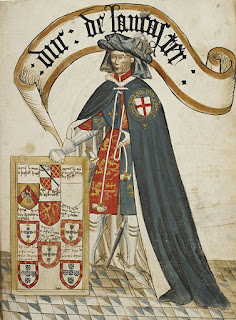He was born about 1310 at Grosmont Castle in Wales. He referred to himself in his memoirs as tall, slim, and good-looking. During his youth his father—the wealthiest peer in England—was hostile to the excesses of Edward II; his youth must have been full of radical national events. His family's relationship to the Crown improved once Edward III was enthroned. In fact, Henry's father—although old and nearly blind—was chosen to ceremoniously knight Edward at the Coronation.
Henry was knighted the same year and, because of his father's increasing infirmity, represented his father in parliament and at the King's Council. He took over the management of his father's estates, including Bolingbroke Castle and the Savoy in London.
Henry and Edward III were only two years apart in age, which probably helped their personal relationship. Henry distinguished himself with Edward and on Edward's behalf in a dozen battles of the Hundred Years War, the Second War of Scottish Independence, as well as the "Northern Crusades" in the Baltics.
In 1345, Edward decided to attack France. As part of this campaign, Henry arrived at Bordeaux in August with 500 men-at-arms and 1500 archers (500 of the archers were mounted), as well as support troops. He was very successful at surprising the enemy with swift attacks: they were accustomed to the English setting up long, drawn-out sieges. While there, Henry's father died, making young Henry the Earl of Lancaster and the wealthiest peer of the realm. He also inherited the Barony of Halton (which would also pass to his son-in-law John of Gaunt, and then John's son Henry Bolingbroke, who would become King Henry IV).
In 1347, the king elevated Henry to the rare title of duke, in this case Duke of Lancaster. With the title he was granted palatinate powers, a condition available in England, Ireland, and Wales that allowed the person holding it to operate almost independently from the Crown. This was an enormous amount of power for the king to "give away," but since Henry had no male heir, this seemed to be a gift to Henry that would not go further than his lifetime.
Edward also made Henry a founding member of the new Order of the Garter.
Much of his life can be determined from his own writing. Tomorrow I'd like to talk about something he wrote: Le Livre de Seyntz Medicines, "The Book of Holy Medicine."

No comments:
Post a Comment
Note: Only a member of this blog may post a comment.